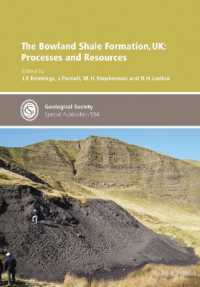- ホーム
- > 洋書
- > 英文書
- > Nature / Ecology
Full Description
Environmental history of India has developed as an important field of inquiry in the last twenty-five years. While providing major insights, the existing scholarship has primarily focused on drawing sharp lines of distinction-those between geographical spaces (forest, rivers, farms), people (herders, farmers, townspeople), eras (colonial, post-colonial), and so on. The limitations of these sharp divides are brought to the forefront when there is a critical engagement with the region's contested environmental past.
Shifting Ground brings together an array of essays that pose critical questions regarding India's environmental past and the way it has been approached by scholars. From debunking the idea of a primeval, pristine forest cover, to analysing the dynamics that shape human-animal relations, to examining the conflicts created by post-Independence projects of rural development and conservation-this volume touches upon the various aspects of environmental studies and juxtaposes them with social history, history of science and technology, and history of trade and culture.
Drawing on original case studies the book not only explores the past, but also portrays how its traditions are often invoked to be deployed in contemporary conflicts-those that are often aggravated by the pressures on natural assets created by the recent prosperity and the vaulting aspirations of a rapidly expanding Indian middle class.
Contents
Acknowledgements ; 1 Introduction: People, Animals, and Mobility in India's Environmental History, Mahesh Rangarajan and K. Sivaramakrishnan ; 2 Conceiving Ecology and Stopping the Clock: Narratives of Balance, Loss, and Degradation, Kathleen Morrison ; 3 From Eminence to Near Extinction: The Journey of the Greater One-horned Rhino, Shibani Bose ; 4 Lions, Cheetahs, and Others in the Mughal Landscape, Divyabhanusinh ; 5 Environmental Status and Wild Boar in Princely India, Julie Hughes ; 6 The Imperial Ambition of Science and Its Discontents: Animal Breeding in Nineteenth-Century Punjab, Brian Caton ; 7 Making Room Inside Forests: Grazing and Agrarian Conflicts in Colonial Assam, Arupjyoti Saikia ; 8 Nature and Politics at the End of the Raj: Environmental Management and Political Legitimacy in Late Colonial India, 1919-47, Daniel Klingensmith ; 9 How to Be Hindu in the Himalayas: Conflicts over Animal Sacrifice in Uttarakhand, Radhika Govindrajan ; 10 Logjam: Loss of Commons in Mewas from 1930 Onwards, Vikramaditya Thakur ; 11 The 'Tiger Crisis' and the Response: Reclaiming the Wilderness in Sariska Tiger Reserve, Rajasthan, Ghazala Shahabuddin ; Select Bibliography ; About the Editors and Contributors ; Index






